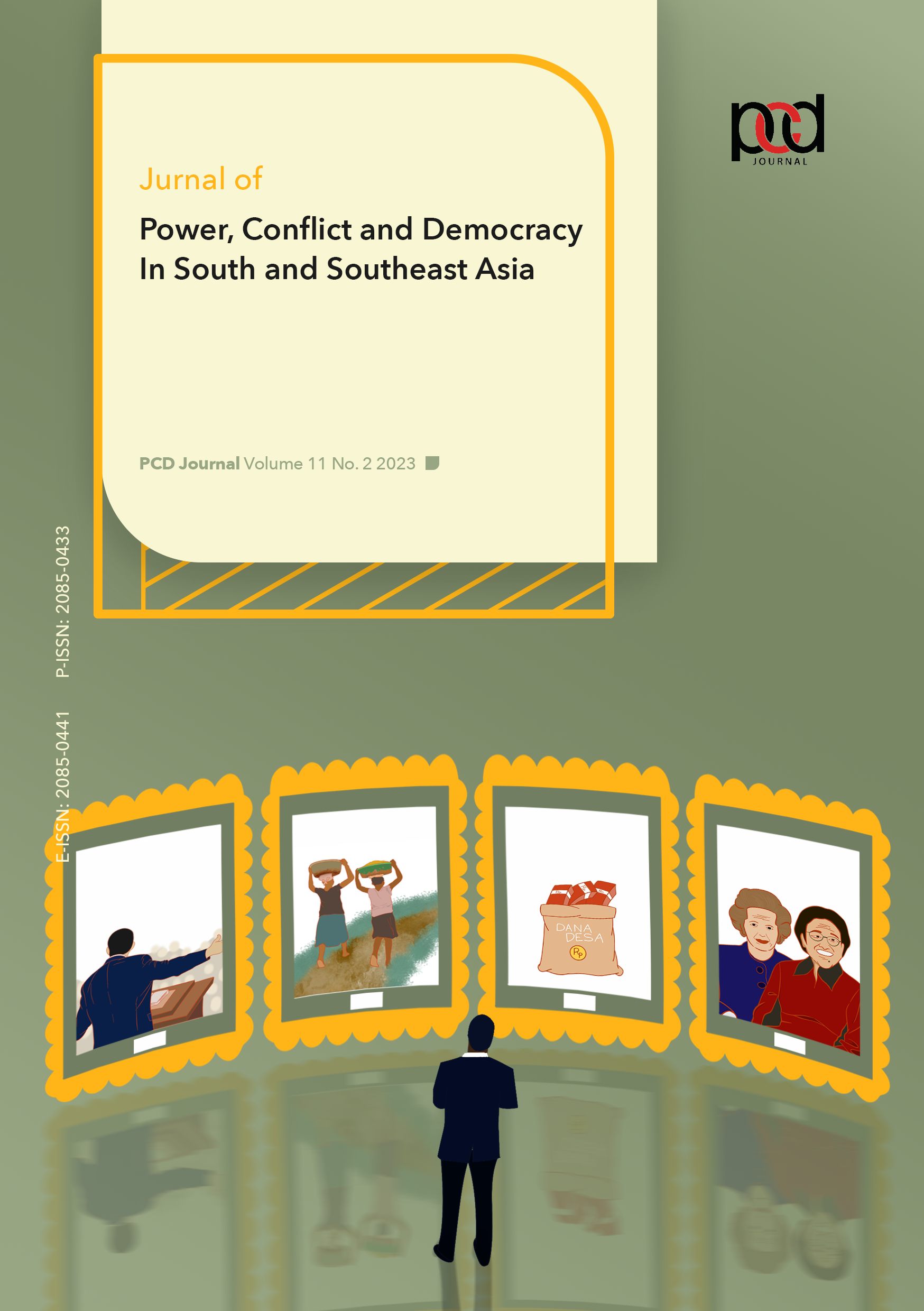From Collective Identity to Counter-Hegemony
Corresponding Author(s) : Handrianus Koli Belolon
PCD Journal,
Vol 11 No 2 (2023): PCD Journal Vol. 11 No. 2 2023
Abstract
In mass media, such as films, the Papuan region and people are still regarded as “the other", for example, portrayed as a people and region that needs to be civilized through various approaches. In addition, Papua is rich in natural wealth and culture, but instead of bringing prosperity, it become a source of new conflicts that threaten the existence and survival of the environment and the Papuan. This condition encourages young Papuan filmmakers and members of the Papuan Voices (PV) community to create an alternative narrative about Papua. Through documentaries produced collectively, they aim to present another side of Papua from the perspective of the Papuans. Using a poststructuralism approach elaborated with Gramsci's theory of hegemony, this study aims to explore the dynamics of collective identity formation and efforts to create counter-narratives as part of a counter-hegemony movement, namely by criticizing inequality and instilling solidarity for Papua. The analysis shows that the formation of PV’s collective identity is based on the history of Papuan suffering memories (memoria passionis) related to the experiences of injustice.
Keywords
Download Citation
Endnote/Zotero/Mendeley (RIS)BibTeX
- Althusser, L. (1971). Lenin and Philosophy and Other Essays. New York: Monthly Review Press.
- Alua, A. A. (2006). Papua Barat dari Pangkuan ke Pangkuan: Suatu Ikhtisar Kronologis. Jayapura: Sekretariat Presidium Dewan Papua dan Biro Penelitian STFT Fajar Timur.
- Anggraeni, D. (2011, July). Another East: Representation of Papua in Popular Media. In PROCEEDINGS ICSSIS 2011 3rd International Conference on Indonesian Studies, FIPB–University of Indonesia. Retrieved from https://icssis.wordpress.com/prosiding/prosiding-icssis-2011/
- Butler, J., Laclau, E., & Žižek, S. (2000). Contingency, Hegemony, Universality: Contemporary Dialogues On The Left. London: Verso.
- Fatubun, W. (2023). Papuan Voices: An Initiative for Decolonized Filmmaking to Document Indigenous People’s Lived Experiences in West Papua. Video Journal of Education and Pedagogy, 8(1), 1-15. https://doi.org/10.1163/23644583-bja10044
- Ginsburg, F. (1995). Mediating Culture: Indigenous Media, Ethnographic Film, and the Production of Identity. In L. Devereaux & R. Hillman (Eds.), Fields of Vision: Essays in Film Studies, Visual Anthropology, and Photography (pp. 256-290). Berkeley and Los Angeles: University of California Press.
- Gramsci, A. (1971). Selections from the Prison Notebooks of Antonio Gramsci (Q. Hoare & G. Nowell-Smith, Trans.). London: Lawrence & Wishart.
- Hutagalung, D. (2006, February). Laclau-Mouffe Tentang Gerakan Sosial. Basis, 55(01-02).
- Ives, P. (2004). Language And Hegemony In Gramsci. London: Pluto Press.
- Jones, S. (2006). Antonio Gramsci. London and New York: Routledge.
- Laclau, E., & Mouffe, C. (1985). Hegemony and Socialist Strategy: Towards a Radical Democratic Politics. London and New York: Verso.
- Melucci, A. (1989). Nomads of the Present: Social Movements and Individual Needs in Contemporary Society. Philadelphia: Temple University Press.
- Patria, N., & Arief, A. (1999). Antonio Gramsci: Negara dan Hegemoni. Yogyakarta: Pustaka Pelajar.
- Saukko, P. (2003). Doing Research in Cultural Studies: An Introduction to Classical and New Methodological Approaches. London: SAGE Publications.
- Simon, R. (2004). Gagasan-Gagasan Politik Gramsci (Kamdani & I. Baihaqi, Trans.). Yogyakarta: Pustaka Pelajar.
- Suryawan, I. N. (2011). Antropologi Gerakan Sosial: Membaca Transformasi Identitas Budaya di Kota Manokwari, Papua Barat. Humaniora, 23(3), 290-300.
- Williams, R. (1989). Resources of Hope: Culture, Democracy, and Socialism. London: Verso.
- Yayusman, M. S., & Pamungkas, C. (2023). Papuan Voices: Digital Media Usage for Peacebuilding. Journal of Peacebuilding & Development, 18(3), 347-352. https://doi.org/10.1177/15423166231201125
